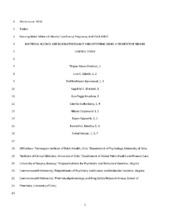| dc.contributor.author | Eilertsen, Espen Moen | en_US |
| dc.contributor.author | Gjerde, Line C. | en_US |
| dc.contributor.author | Reichborn-Kjennerud, Ted | en_US |
| dc.contributor.author | Ørstavik, Ragnhild | en_US |
| dc.contributor.author | Knudsen, Gun Peggy | en_US |
| dc.contributor.author | Stoltenberg, Camilla | en_US |
| dc.contributor.author | Czajkowski, Nikolai Olavi | en_US |
| dc.contributor.author | Røysamb, Espen | en_US |
| dc.contributor.author | Kendler, Kenneth S | en_US |
| dc.contributor.author | Ystrøm, Eivind | en_US |
| dc.date.accessioned | 2018-04-25T10:58:28Z | |
| dc.date.available | 2018-04-25T10:58:28Z | |
| dc.date.issued | 2017-10 | |
| dc.Published | Eilertsen EM, Gjerde L, Reichborn-Kjennerud T, Ørstavik R, Knudsen GPS, Stoltenberg C, Czajkowski NO, Røysamb E, Kendler KS, Ystrøm E. Maternal alcohol use during pregnancy and offspring attention-deficit hyperactivity disorder (ADHD): a prospective sibling control study. International Journal of Epidemiology. 2017;46(5):1633-1640 | eng |
| dc.identifier.issn | 1464-3685 | |
| dc.identifier.issn | 0300-5771 | |
| dc.identifier.uri | https://hdl.handle.net/1956/17654 | |
| dc.description.abstract | Background: Maternal alcohol use during pregnancy has repeatedly been associated with development of attention-deficit hyperactivity disorder (ADHD) in the offspring. It is, however not known whether this reflects a direct casual intra-uterine effect or a non-causal relationship due to confounding. We used three different approaches to control for measured and unmeasured confounding: statistical adjustment for covariates, negative control comparison against maternal pre-pregnancy alcohol use, and comparison among differentially exposed siblings. Methods: The sample comprised 114 247 children (34 283 siblings) from 94 907 mothers, recruited to the Norwegian Mother and Child Birth Cohort Study between 1999 and 2008. Self-reported measurements of alcohol use were obtained in week 30 during the pregnancy. Mothers rated offspring ADHD symptoms at 5 years on two measures. Clinical ADHD diagnoses were obtained from the Norwegian Patient Registry. Results: We found an overall positive association between maternal alcohol use during pregnancy and offspring ADHD symptoms, which was only marginally attenuated after inclusion of measured covariates. Both the negative control and the sibling comparison analysis further attenuated the estimated association, but it remained greater than zero [ β = 0.017, 95% confidence interval (CI) = 0.005–0.030). No association was found between maternal alcohol use during pregnancy and offspring ADHD diagnosis. Conclusions: For offspring ADHD symptoms we found a weak, but possibly causal association with maternal alcohol use during pregnancy, but no such effect was observed for clinical ADHD diagnosis. | en_US |
| dc.language.iso | eng | eng |
| dc.publisher | Oxford University Press | eng |
| dc.subject | ADHD symptoms | eng |
| dc.subject | ADHD diagnosis | eng |
| dc.subject | prenatal alcohol exposure | eng |
| dc.subject | negative control | eng |
| dc.subject | sibling control | eng |
| dc.subject | MoBa cohort study | eng |
| dc.title | Maternal alcohol use during pregnancy and offspring attention-deficit hyperactivity disorder (ADHD): a prospective sibling control study | en_US |
| dc.type | Peer reviewed | |
| dc.type | Journal article | |
| dc.date.updated | 2018-02-01T13:18:44Z | |
| dc.description.version | acceptedVersion | en_US |
| dc.rights.holder | Copyright The Author(s) 2017; all rights reserved | |
| dc.identifier.doi | https://doi.org/10.1093/ije/dyx067 | |
| dc.identifier.cristin | 1468864 | |
| dc.source.journal | International Journal of Epidemiology | |
| dc.relation.project | Norges forskningsråd: 231105 | |
